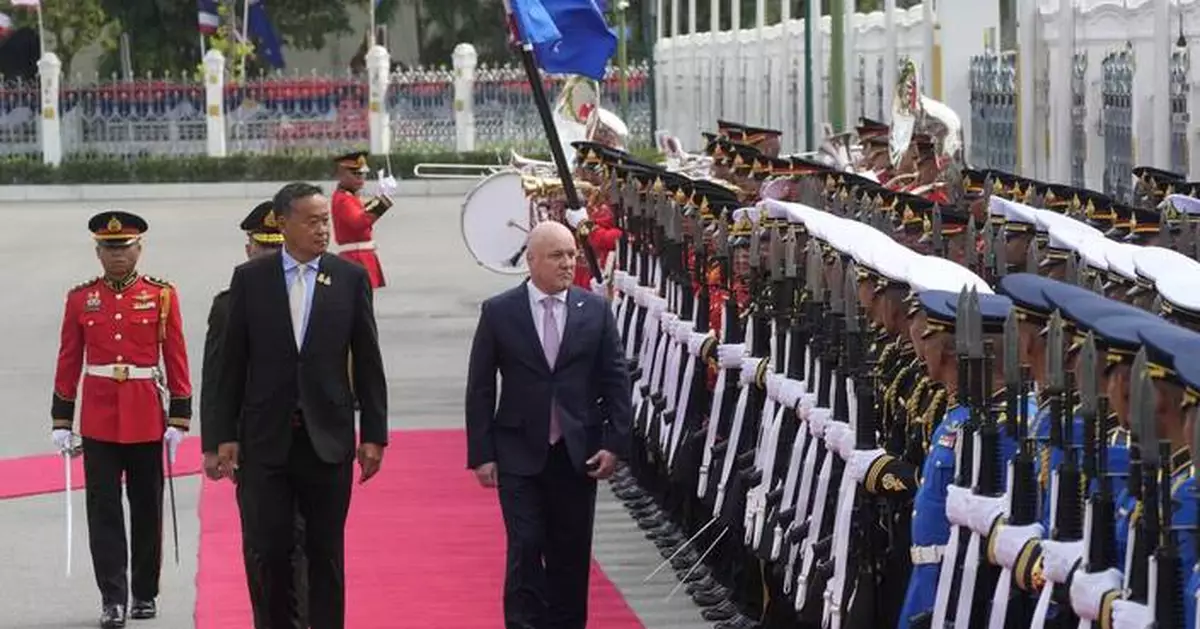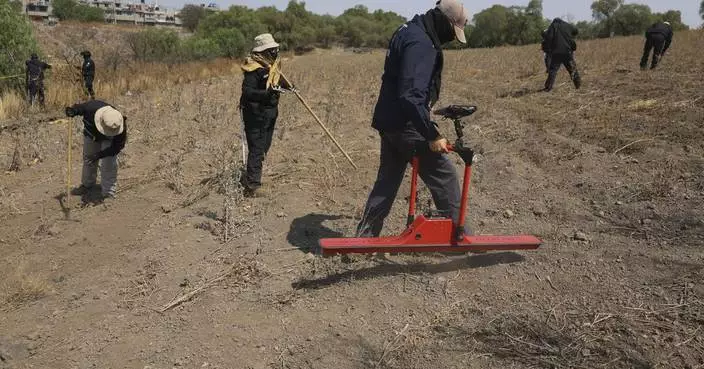BANGKOK (AP) — Thailand and New Zealand on Wednesday vowed to boost economic cooperation with an aim to triple two-way trade by 2045, as the New Zealand leader visited Thailand for the first time in 11 years.
New Zealand Prime Minister Christopher Luxon arrived in Bangkok on Tuesday and met with his Thai counterpart Srettha Thavisin at the government house on Wednesday. They discussed trade, education, investment, visa arrangements, tourism, transnational crime and cybersecurity.
Click to Gallery
BANGKOK (AP) — Thailand and New Zealand on Wednesday vowed to boost economic cooperation with an aim to triple two-way trade by 2045, as the New Zealand leader visited Thailand for the first time in 11 years.
New Zealand's Prime Minister Christopher Luxon, right, is escorted by Thai Prime Minister Srettha Thavisin, before a welcoming ceremony at the Government House in Bangkok, Thailand, Wednesday, April 17, 2024. (AP Photo/Sakchai Lalit)
A Thai soldier checks royal guards before a welcome ceremony for New Zealand's Prime Minister Christopher Luxon in Bangkok, Thailand, Wednesday, April 17, 2024. (AP Photo/Sakchai Lalit)
New Zealand's Prime Minister Christopher Luxon, foreground, escorted by Thailand's Prime Minister Srettha Thavisin, listens to national anthems during a welcoming ceremony at the Government House in Bangkok, Thailand, Wednesday, April 17, 2024. (AP Photo/Sakchai Lalit)
Thailand's Prime Minister Srettha Thavisin, second left, and New Zealand's Prime Minister Christopher Luxon, third left, bow in front of Thailand and New Zealand national flags during a welcome ceremony at the government house in Bangkok, Thailand, Wednesday, April 17, 2024. (AP Photo/Sakchai Lalit)
New Zealand's Prime Minister Christopher Luxon, left, reviews an honor guard during a welcome ceremony at the government house in Bangkok, Thailand, Wednesday, April 17, 2024. (AP Photo/Sakchai Lalit)
Thailand's Prime Minister Srettha Thavisin, front left, and New Zealand's Prime Minister Christopher Luxon, front right, review an honor guard during a welcome ceremony at the government house in Bangkok, Thailand, Wednesday, April 17, 2024. (AP Photo/Sakchai Lalit)
“We have agreed to elevate Thailand-New Zealand relations to a strategic partnership in 2026 or sooner, which will mark the 70th anniversary of our diplomatic relations. This will create the momentum for us to further expand and deepen cooperation in all dimensions,” Srettha said during a joint news conference after the meeting.
Luxon said that trade between the countries has tripled since a free trade agreement was signed 20 years ago.
"But today we have committed to look for further opportunities to expand our economic cooperation and for new opportunities. Today we announced an ambitious goal to triple our two-way trade by 2045,” he said.
Business delegations from both countries also held a meeting helmed by the two prime ministers at the government house, seeking to rapidly expand the bilateral economic relationship.
The two leaders said they looked forward to tariff-free entry for all Thai and New Zealand imports due to take effect Jan. 1. They also said they agreed to further facilitate visas between Thailand and New Zealand, and to resume direct flights that were shut after the pandemic.
Just before the news conference, the prime ministers presided over the signing of two agreements to increase cooperation in education and aviation supply, repair and maintenance.
The situation in neighboring Myanmar was also discussed. Srettha said Thailand is closely watching the tense situation on its northwestern border, where the key Myanmar town of Myawaddy recently fell to forces fighting the military, which seized power in 2021.
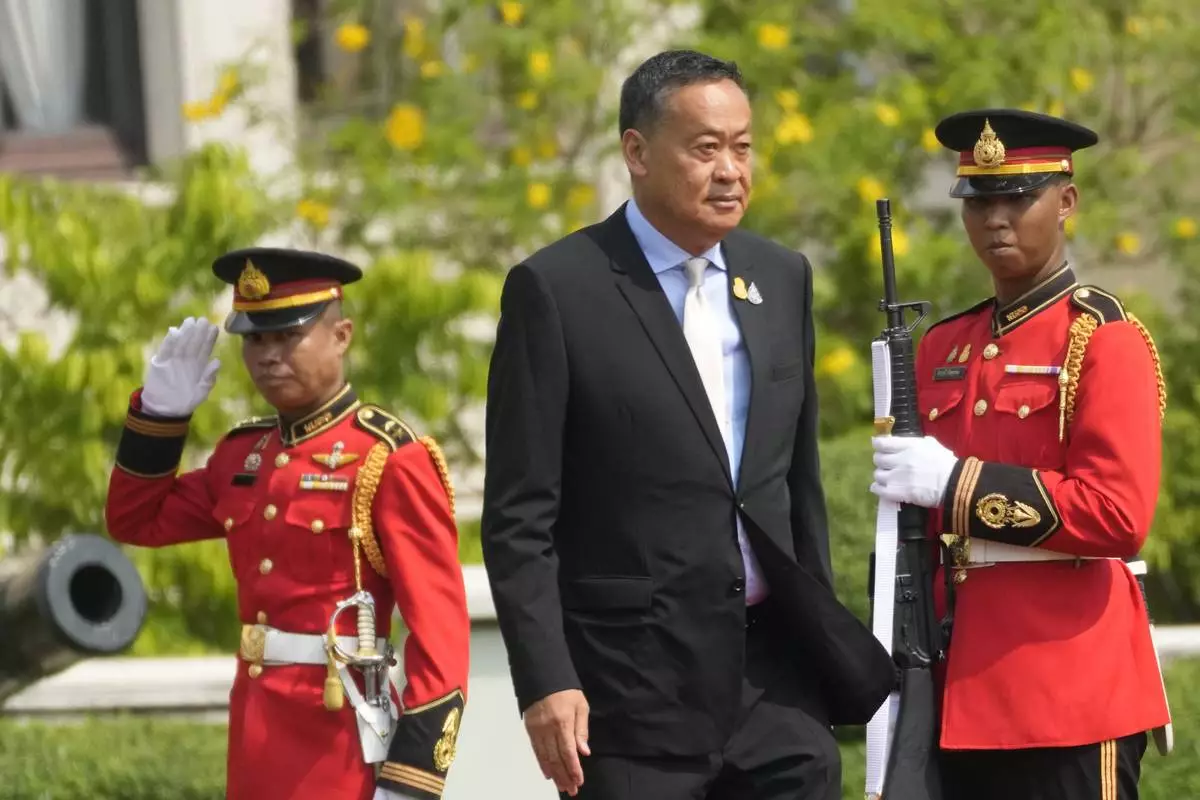
Thailand's Prime Minister Srettha Thavisin, center, arrives before the welcome ceremony for New Zealand's Prime Minister at the government house in Bangkok, Thailand, Wednesday, April 17, 2024. (AP Photo/Sakchai Lalit)
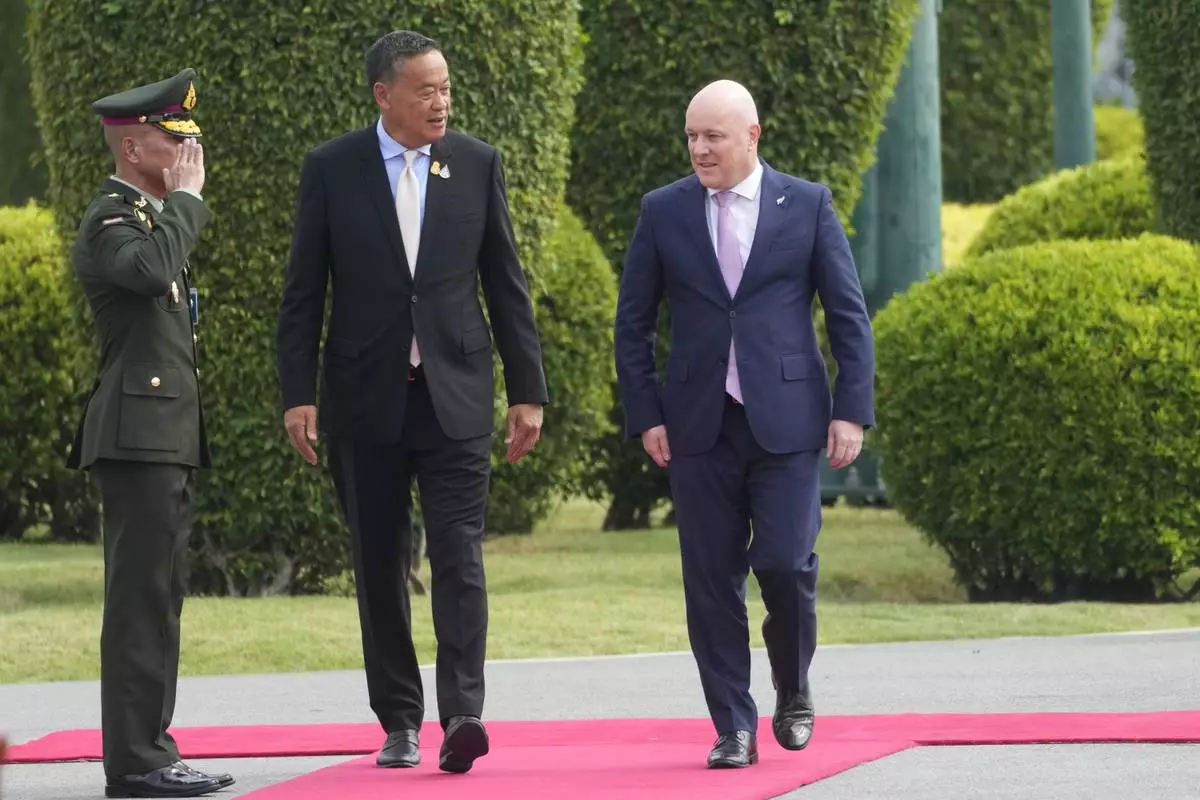
New Zealand's Prime Minister Christopher Luxon, right, is escorted by Thai Prime Minister Srettha Thavisin, before a welcoming ceremony at the Government House in Bangkok, Thailand, Wednesday, April 17, 2024. (AP Photo/Sakchai Lalit)

A Thai soldier checks royal guards before a welcome ceremony for New Zealand's Prime Minister Christopher Luxon in Bangkok, Thailand, Wednesday, April 17, 2024. (AP Photo/Sakchai Lalit)
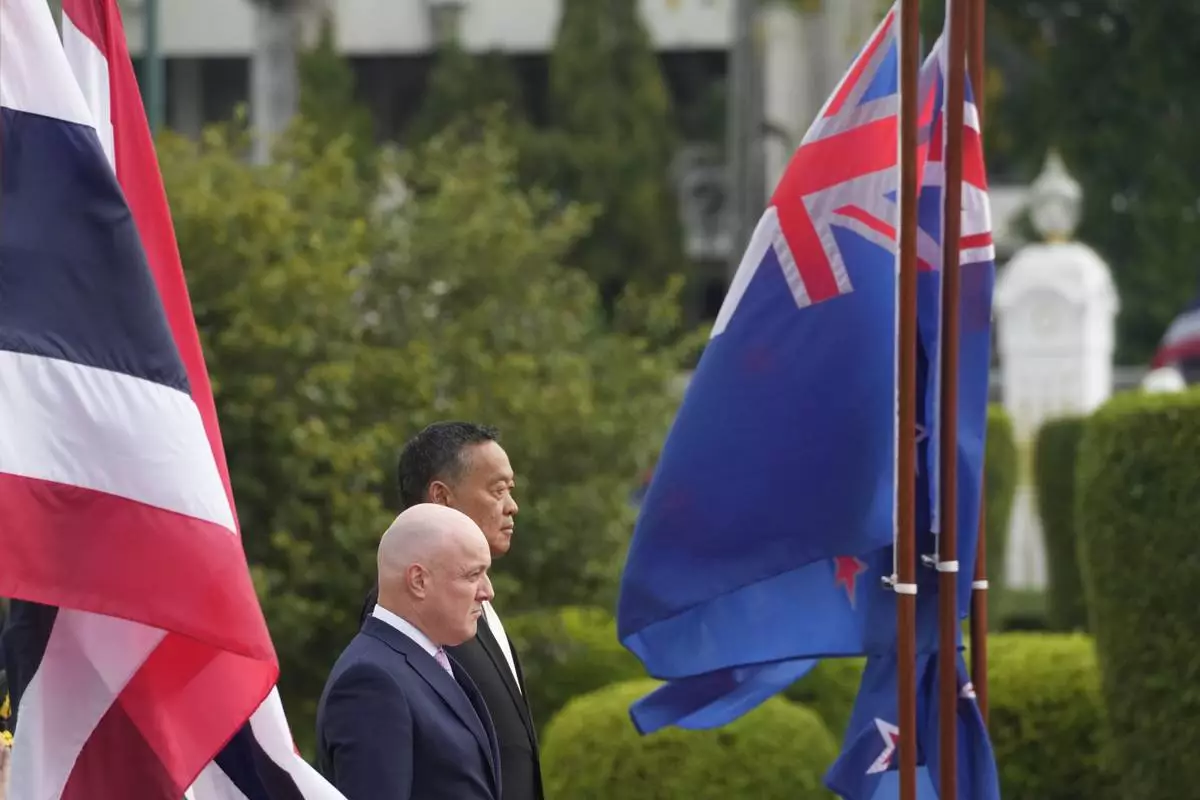
New Zealand's Prime Minister Christopher Luxon, foreground, escorted by Thailand's Prime Minister Srettha Thavisin, listens to national anthems during a welcoming ceremony at the Government House in Bangkok, Thailand, Wednesday, April 17, 2024. (AP Photo/Sakchai Lalit)
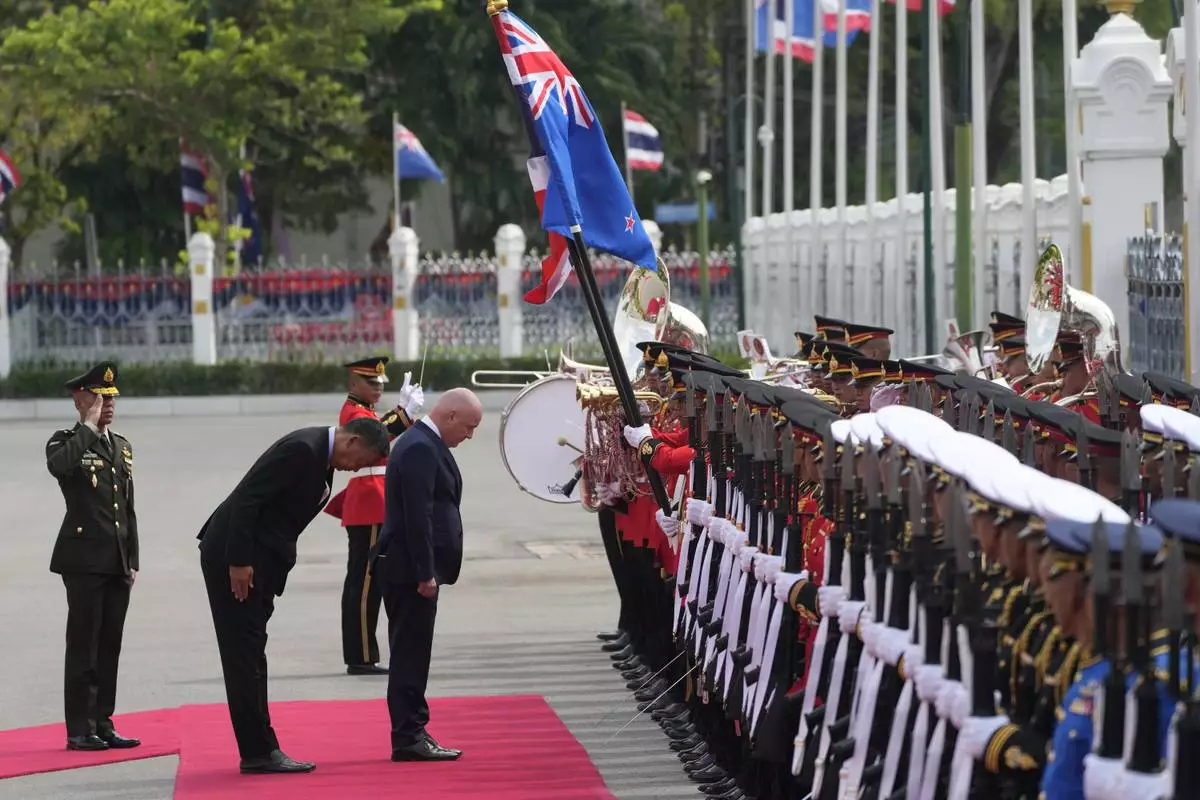
Thailand's Prime Minister Srettha Thavisin, second left, and New Zealand's Prime Minister Christopher Luxon, third left, bow in front of Thailand and New Zealand national flags during a welcome ceremony at the government house in Bangkok, Thailand, Wednesday, April 17, 2024. (AP Photo/Sakchai Lalit)
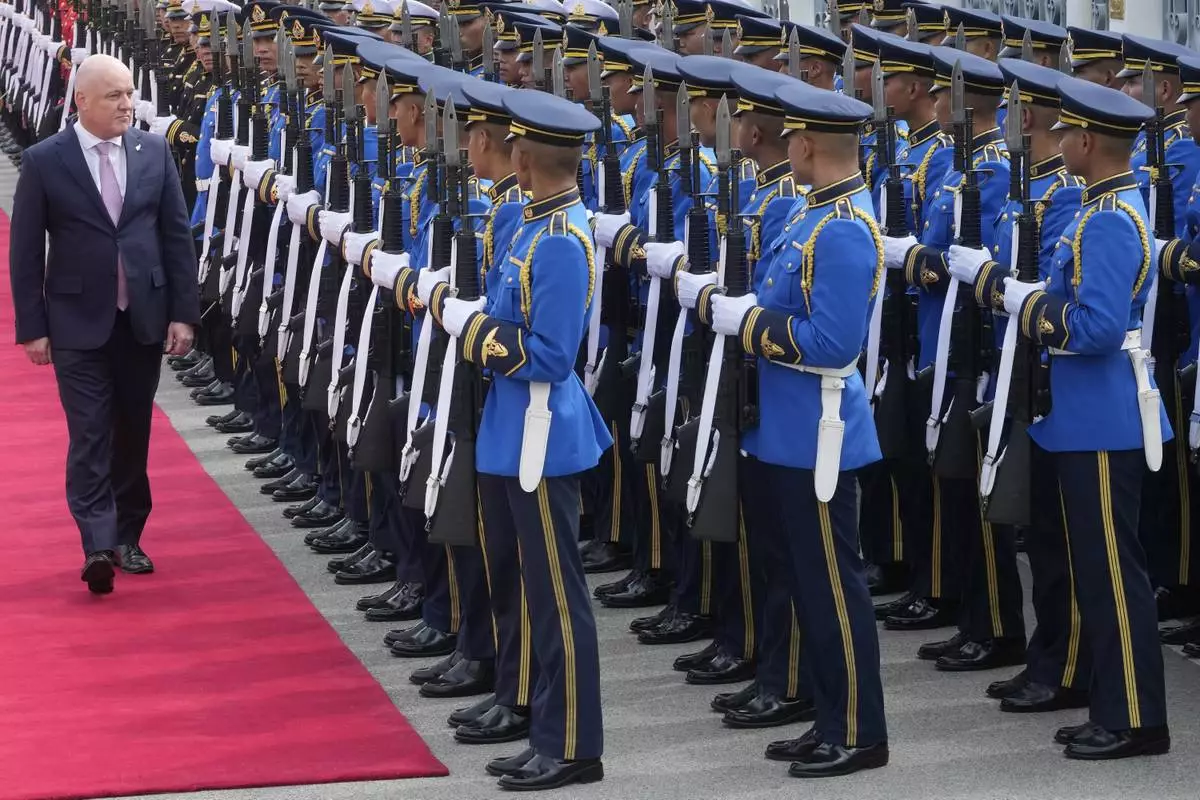
New Zealand's Prime Minister Christopher Luxon, left, reviews an honor guard during a welcome ceremony at the government house in Bangkok, Thailand, Wednesday, April 17, 2024. (AP Photo/Sakchai Lalit)
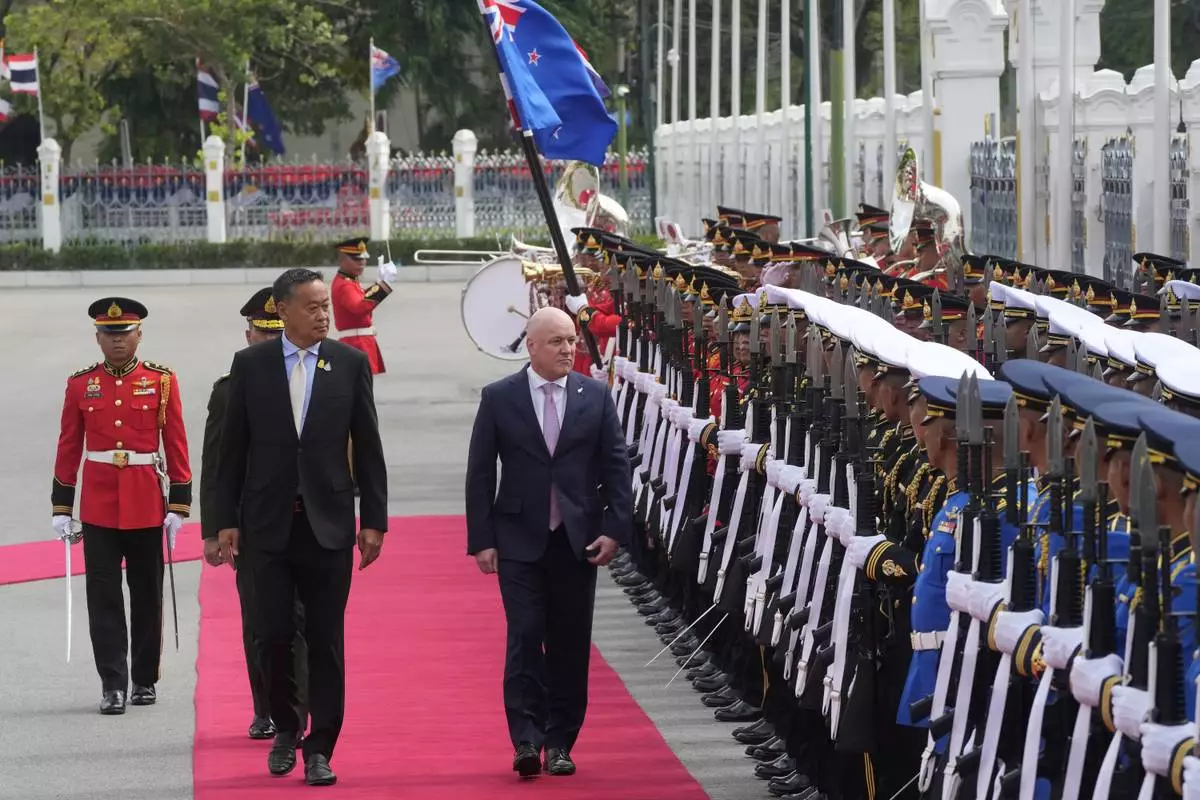
Thailand's Prime Minister Srettha Thavisin, front left, and New Zealand's Prime Minister Christopher Luxon, front right, review an honor guard during a welcome ceremony at the government house in Bangkok, Thailand, Wednesday, April 17, 2024. (AP Photo/Sakchai Lalit)
WASHINGTON (AP) — The United States on Wednesday imposed new sanctions on hundreds of companies and people tied to Russia's weapons development program, more than a dozen Chinese entities accused of helping Moscow find workarounds to earlier penalties, and individuals linked to the death of Kremlin opposition leader Alexei Navalny.
The actions by the departments of Treasury and State target Russia’s military-industrial base, chemical weapons programs and people and companies in third countries that help Russia acquire weapons components as its invasion of Ukraine has entered its third year.
Treasury Secretary Janet Yellen said the action “will further disrupt and degrade Russia’s war efforts by going after its military industrial base and the evasion networks that help supply it.”
The Senate, meanwhile, gave final approval to legislation barring imports of Russian uranium, boosting U.S. efforts to disrupt Russia’s war in Ukraine. Democratic President Joe Biden is expected to sign the bill into law.
About 12% of the uranium used to produce electricity at U.S. nuclear power plants is imported from Russia, according to the U.S. Energy Information Administration.
A spokesperson for the National Security Council said Wednesday that Biden shares lawmakers’ concerns about U.S. reliance on Russia for low-enriched uranium to support its domestic nuclear fleet.
Included in the administration's announcement are importers of cotton cellulose and nitrocellulose, which are used to produce gunpowder, rocket propellants and other explosives. The penalties also target Russian government entities and people tied to Russia's chemical and biological weapons programs, companies related to Russia's natural gas construction projects and three workers at the penal colony where Navalny died.
Russian President Vladimir Putin has railed against earlier rounds of U.S. and Western penalties, claiming they are “illegitimate sanctions” on his country.
A group of 16 targets in China and Hong Kong, most of which are related to Russian procurement workarounds, are named by the Biden administration.
Yellen traveled to Guangzhou and Beijing last month to warn Chinese officials that they “must not provide material support for Russia’s war and that they will face significant consequences if they do."
China has said it is not providing Russia with arms or military assistance, although Beijing has maintained robust economic connections with Moscow, alongside India and other countries, as the West imposes sanctions.
Companies in China, Azerbaijan, Belgium, Slovakia, Turkey and the United Arab Emirates were accused of helping Russia acquire technology and equipment from abroad. The penalties aim to block them from using the U.S. financial system and bar American citizens from dealing with them.
Biden last week said he would immediately rush badly needed weaponry to Ukraine as he signed into law a $95 billion war aid measure that also included assistance for Israel, Taiwan and other global hot spots.
The upcoming uranium ban is also expected to impact Russian revenues by at least $1 billion. The U.S. banned Russian oil imports after Russia invaded Ukraine in early 2022 but did not against uranium, despite frequent calls to do so by U.S. lawmakers in both parties.
Wyoming Sen. John Barrasso, the top Republican on the Senate Energy and Natural Resources Committee, called the import ban “a tremendous victory” and said it “will help defund Russia’s war machine, revive American uranium production and jumpstart investments in America’s nuclear fuel supply chain.″
“Wyoming has the uranium to replace Russian imports, and we’re ready to use it,″ Barrasso added.
West Virginia Sen. Joe Manchin, a Democrat who heads that Senate committee, said it was "unconscionable” for the U.S. to help make it possible for Putin to “finance his unlawful war against Ukraine” through U.S. reliance on Russian uranium.
Besides the import ban, the legislation frees up $2.7 billion in previously authorized funding to ramp up domestic uranium production.

FILE- This June 6, 2019, file photo shows the U.S. Treasury Department building at dusk in Washington. The United States has imposed new sanctions on hundreds of firms and people tied to Russia’s weapons development program, more than a dozen Chinese firms accused of helping Russia find workarounds to sanctions and individuals tied to the death of Russian dissident Alexey Navalny. The sanctions imposed Wednesday by the Treasury and State departments target Russia’s military-industrial base, chemical weapons programs and people and firms in third countries that help Russia acquire weapons components as its invasion of Ukraine has entered its third year. (AP Photo/Patrick Semansky, File)









